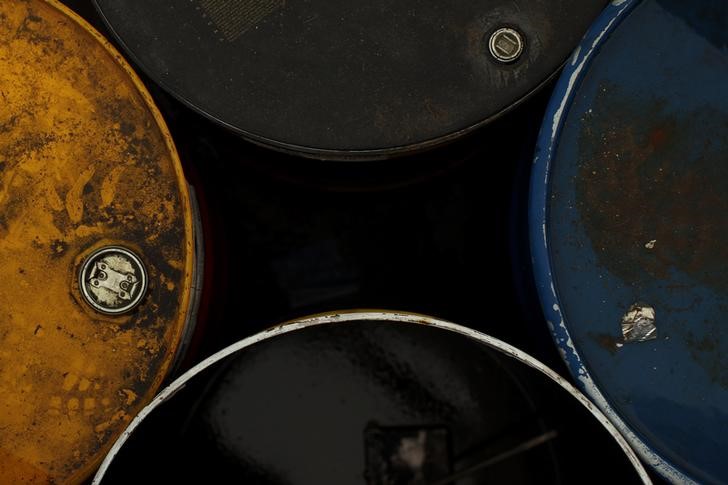LONDON, May 12 (Reuters) - Unplanned disruption to oil
production in the likes of Canada, Nigeria or Libya could help
run down a global overhang of unused crude this year, while
demand will profit from growing gasoline consumption, the
International Energy Agency said on Thursday.
The IEA said output from non-OPEC producers is expected to
fall by 800,000 barrels per day (bpd) in 2016, an acceleration
from the agency's previous forecast for a drop-off of 710,000
bpd.
On the demand front, the Paris-based IEA left its forecast
for global demand growth broadly unchanged at 1.2 million bpd
for this year, but said the risks to future forecasts lay to the
upside.
"Any changes to our current 2016 global demand outlook are
now more likely to be upwards than downwards, as gasoline demand
grows strongly in nearly every key market, more than offsetting
weakness in middle distillates," the IEA said in its monthly Oil
Market Report.
"Slower demand growth in OECD (Organisation for Economic
Co-operation and Development) countries is not unexpected; it
represents a return to the norm," it added.
A wildfire in the Canadian province of Alberta has taken
more than 1 million bpd of capacity offline over the start of
May, but the IEA noted outages in Nigeria, Libya, Venezuela and
Kuwait, plus falling U.S. shale output, have also eaten into
global output.
The build in global inventories of crude oil is expected to
slow to just 200,000 bpd in the second half of this year, from
1.3 million bpd in the first half, the IEA said.
OPEC supply, led by increases in Iran, Iraq and the United
Arab Emirates, pushed the group's output up by 330,000 bpd in
April to a seven-year high of 32.76 million bpd, the agency
said.
- English (USA)
- English (UK)
- English (India)
- English (Australia)
- English (South Africa)
- English (Philippines)
- English (Nigeria)
- Deutsch
- Español (España)
- Español (México)
- Français
- Italiano
- Nederlands
- Português (Portugal)
- Polski
- Português (Brasil)
- Русский
- Türkçe
- العربية
- Ελληνικά
- Svenska
- Suomi
- עברית
- 日本語
- 한국어
- 简体中文
- 繁體中文
- Bahasa Indonesia
- Bahasa Melayu
- ไทย
- Tiếng Việt
- हिंदी
Oil output disruptions to erode surplus, demand may surprise - IEA
Published 2016-05-12, 04:00 a/m
Oil output disruptions to erode surplus, demand may surprise - IEA

Latest comments
Install Our App
Risk Disclosure: Trading in financial instruments and/or cryptocurrencies involves high risks including the risk of losing some, or all, of your investment amount, and may not be suitable for all investors. Prices of cryptocurrencies are extremely volatile and may be affected by external factors such as financial, regulatory or political events. Trading on margin increases the financial risks.
Before deciding to trade in financial instrument or cryptocurrencies you should be fully informed of the risks and costs associated with trading the financial markets, carefully consider your investment objectives, level of experience, and risk appetite, and seek professional advice where needed.
Fusion Media would like to remind you that the data contained in this website is not necessarily real-time nor accurate. The data and prices on the website are not necessarily provided by any market or exchange, but may be provided by market makers, and so prices may not be accurate and may differ from the actual price at any given market, meaning prices are indicative and not appropriate for trading purposes. Fusion Media and any provider of the data contained in this website will not accept liability for any loss or damage as a result of your trading, or your reliance on the information contained within this website.
It is prohibited to use, store, reproduce, display, modify, transmit or distribute the data contained in this website without the explicit prior written permission of Fusion Media and/or the data provider. All intellectual property rights are reserved by the providers and/or the exchange providing the data contained in this website.
Fusion Media may be compensated by the advertisers that appear on the website, based on your interaction with the advertisements or advertisers.
Before deciding to trade in financial instrument or cryptocurrencies you should be fully informed of the risks and costs associated with trading the financial markets, carefully consider your investment objectives, level of experience, and risk appetite, and seek professional advice where needed.
Fusion Media would like to remind you that the data contained in this website is not necessarily real-time nor accurate. The data and prices on the website are not necessarily provided by any market or exchange, but may be provided by market makers, and so prices may not be accurate and may differ from the actual price at any given market, meaning prices are indicative and not appropriate for trading purposes. Fusion Media and any provider of the data contained in this website will not accept liability for any loss or damage as a result of your trading, or your reliance on the information contained within this website.
It is prohibited to use, store, reproduce, display, modify, transmit or distribute the data contained in this website without the explicit prior written permission of Fusion Media and/or the data provider. All intellectual property rights are reserved by the providers and/or the exchange providing the data contained in this website.
Fusion Media may be compensated by the advertisers that appear on the website, based on your interaction with the advertisements or advertisers.
© 2007-2025 - Fusion Media Limited. All Rights Reserved.